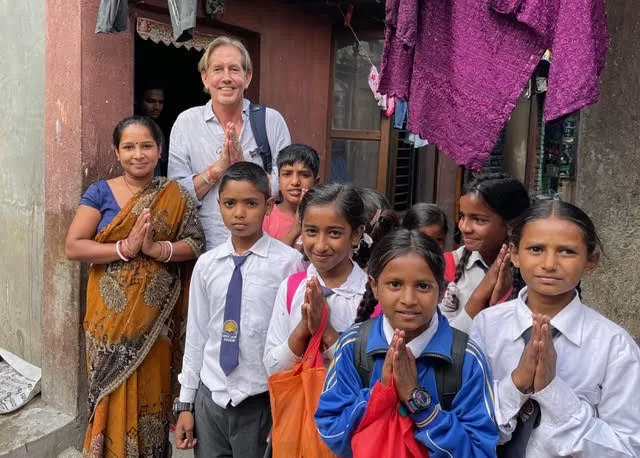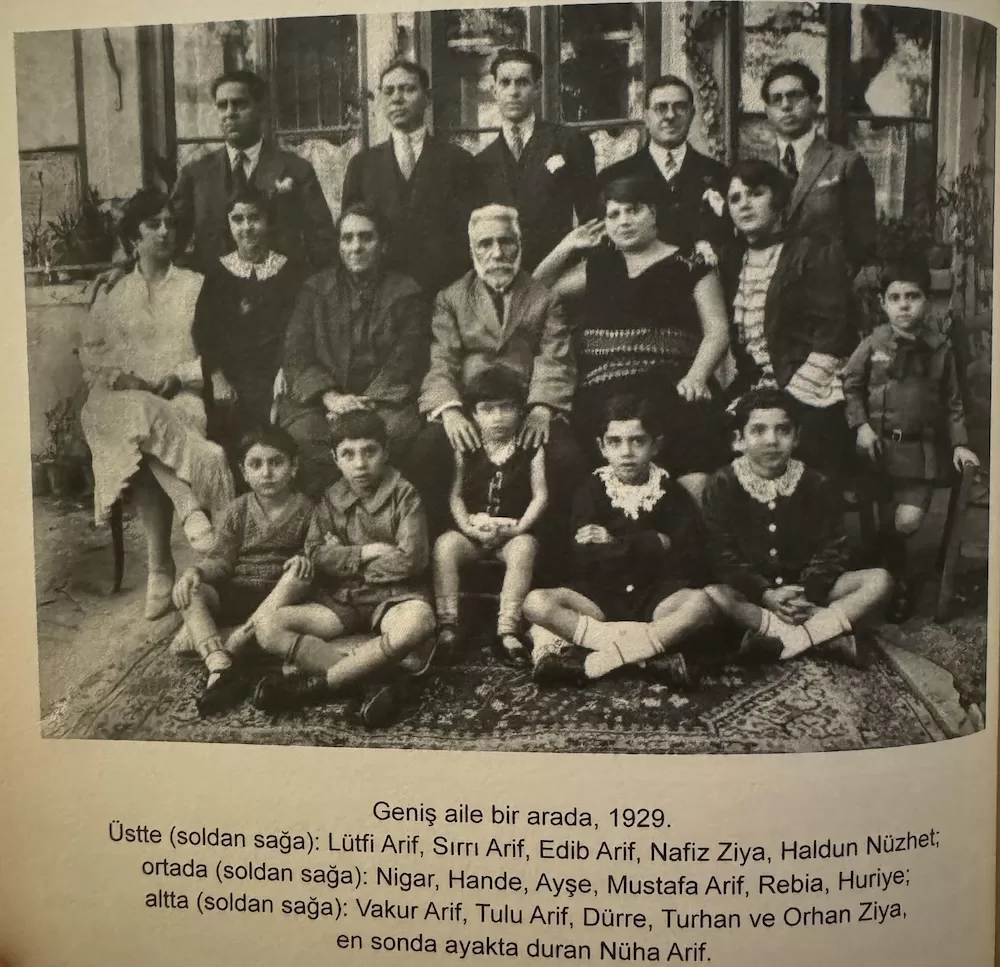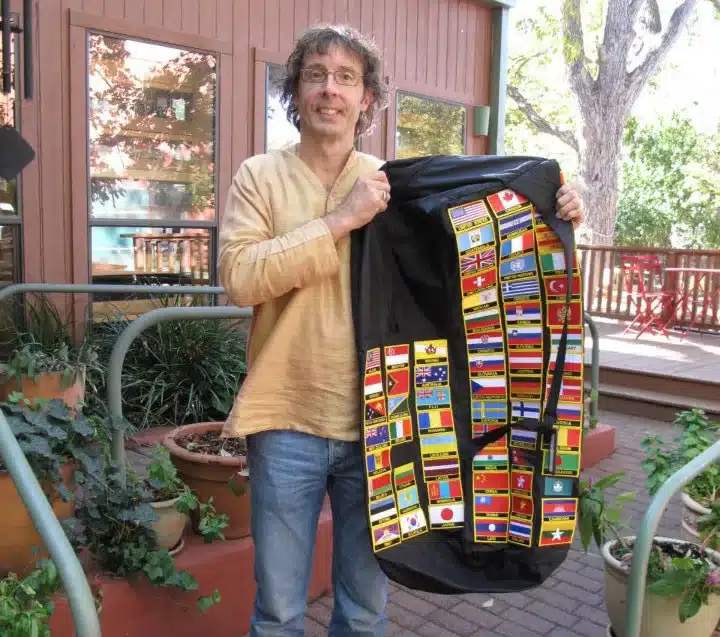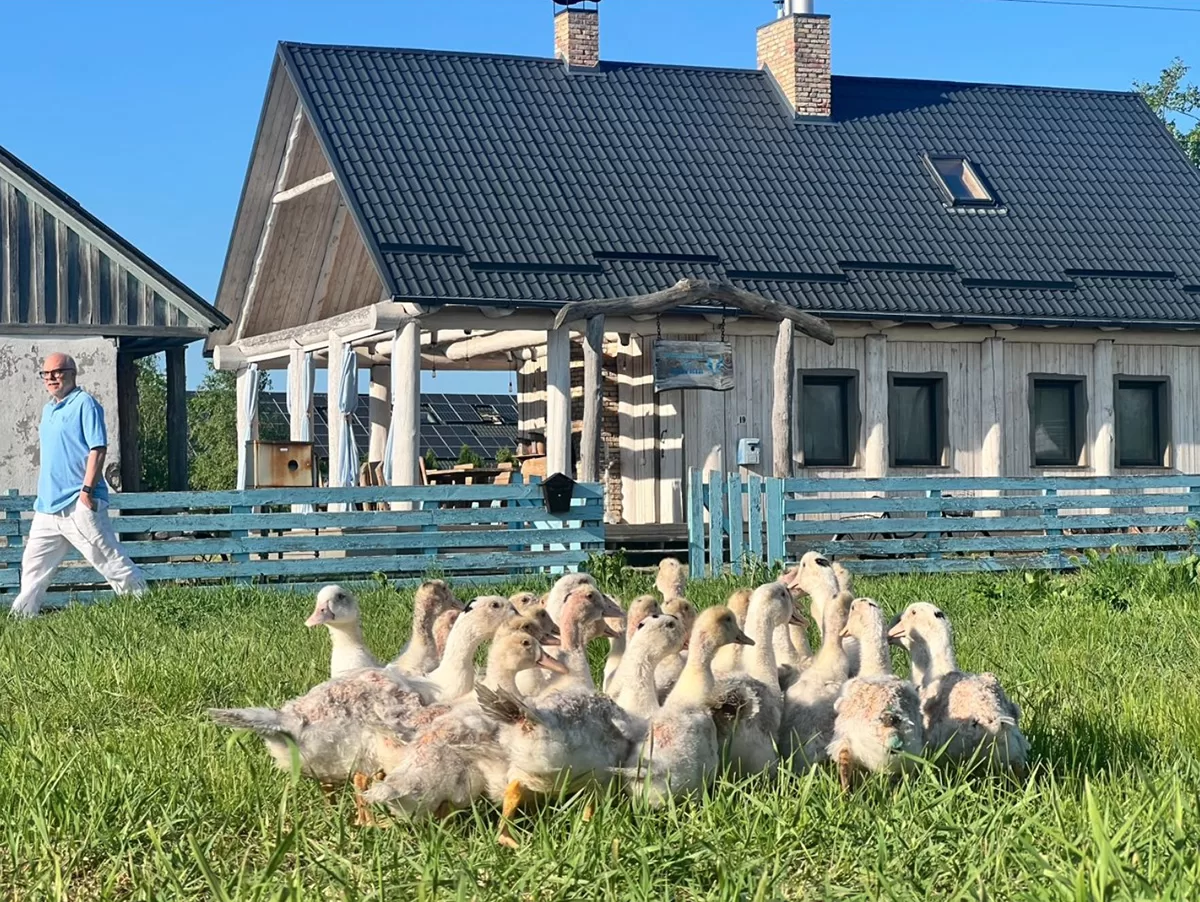James Hopkins had what some might consider an ideal youth and early adulthood. He grew up at a boarding school in rural Virginia, where his father taught, attended a top East Coast university and found himself, by his mid-twenties, making very good money in finance.
But at the height of it all he decided to leave the grind of Wall Street and move to Nepal to study Buddhism. That, somehow, led to a very different type of finance work, which had him traveling around the world in the entourage of a prominent holy man.
Now at 63, when he’s not traveling around Asia or visiting the U.S., he leads a hugely impactful educational non-profit and organizes regular literature gatherings.
David Lepeska: You majored in French literature at Duke University and studied in Paris your junior year. What first struck you about this new country and culture?
James Hopkins: I’d been to the Caribbean, but this was definitely my first trip to another major country. I was very very American and knew nothing about the ways of the world. I had my Let’s Go France and was checking off sites, going to Pere Lechaise to find Jim Morrison’s grave and all that.
I was overseas for six months, France, and England and Spain, using an inter-rail pass around Europe. It was a winter semester that went to late spring, so I stayed on and worked in France in the summer, in a hunting chateau in the Loir-et-Cher region.
I was hired to take care of horses, which I knew nothing about. At one point the family wanted to go to Mykonos and asked if I’d come and care for their kids, and that opened a whole new door. We went to Mykonos for a month, staying with the Marnier family, of Grand Marnier fame.
They had a house on a hill and I actually stayed in one of those famous Mykonos windmillls with his grandson and went surfing on a nude beach everyday. I was in absolute heaven. When I got back to Duke I was wearing scarves and smoking Gitanes and trying to be all that.
I’d experienced real independence for the first time. I loved it, and couldn’t wait to get back out in the world again.
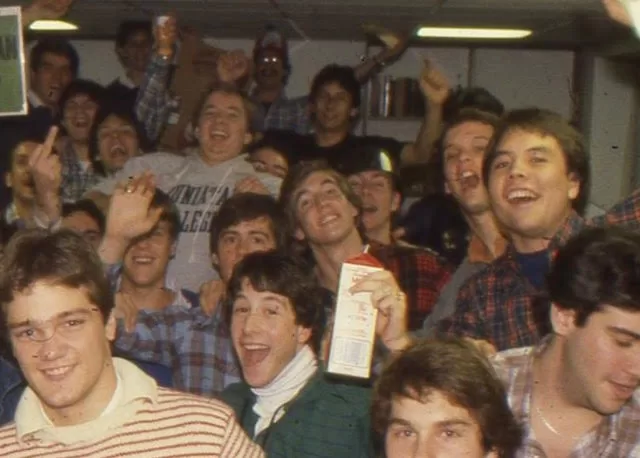
But it was the era of Reagan and “greed is good”, so after graduation you took a different path. You’d taken a few economics classes and decided to go into finance.
It was sort of still the Wild West on Wall Street. You could talk yourself into a job, you didn’t need to have the credentials you need today. An old buddy of mine, his girlfriend was a receptionist at Paine Webber and got me an interview there.
I bought a suit, hopped on a bus, and wrote down all the qualities I thought they wanted—assertive, confident, determined. Sitting outside the supervisor’s office, I kept repeating these words before I walked into the interview, and I guess I seemed to be that person.
They handed me a Yellow Pages of Manhattan and a phone and said go for it. Sitting right next to me, I’m not kidding, was a guy who had been juggling chainsaws in Washington Square Park the week before, so I was in good company.
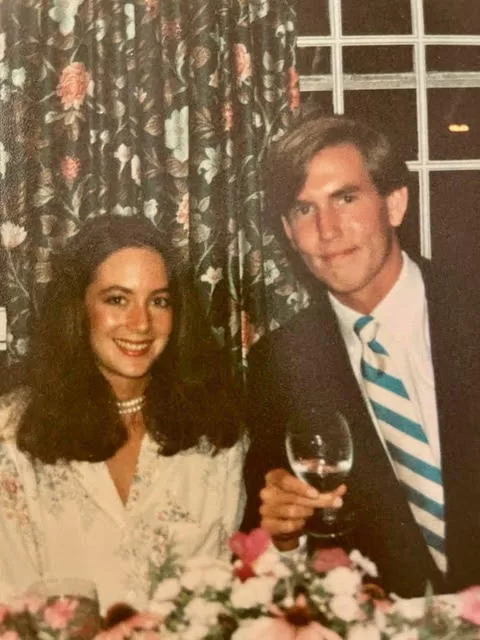
You did well for yourself, had a yacht, a house in Malibu, a corner office in DC, where you’d moved to in the 1990s. Yet also wrote poetry, grew a ponytail and had Tibetan art on your office walls. Then, thanks to a bit of travel, you started thinking about a new life.
At first I felt like a fish out of water, being a French major and entering that world. But I had some skill for the job. I was a good listener. I was a good talker, too, being from the South. I sort of BS’d my way through the first few years, and I ended up loving my job. When I woke up in the morning I was happy to go to work.
But then travel happened. For my 32nd birthday, which is in January, I wanted to go some place warm and picked Australia. Staying at a youth hostel in Sydney, I bought two tickets to an INXS concert, invited a cute girl and she said “yes”. We fell in love after the third song and dated for years.
I was blown away by the simplicity and the culture of these people who were deeply happy, compassionate, and kind.
She was a Buddhist who loved Asia, so she took me to India, to where the Buddha had attained enlightenment, in Bodh Gaya. We saw an ad for a teaching event by a Tibetan lama. She knew that lama and said let’s go. I was blown away by the simplicity and the culture of these people who were deeply happy, compassionate, and kind.
I was taken by that philosophy, and by Asia, this idea that 60% of the world operates completely differently than we do. I kept going back, to India, Nepal, Tibet, with this girlfriend and then by myself. After about five years of doing that I saw that a deeper happiness was possible.
A Buddhist would say it’s the happiness that comes from within, not from the outside. I wanted that. My new girlfriend, who was also in finance, also wanted that. So we decided to leave our jobs.
Around that time I was bouncing around the new Paine Webber HR website, after the Swiss firm UBS had bought the company, and I read that if you’ve been working with the firm at least 20 years and are 45 years old you can retire with full benefits.
I was still 18 months away from 45, but I went in to talk to the manager. “I don’t know why you want to do this,” he said, “but OK, sure.”
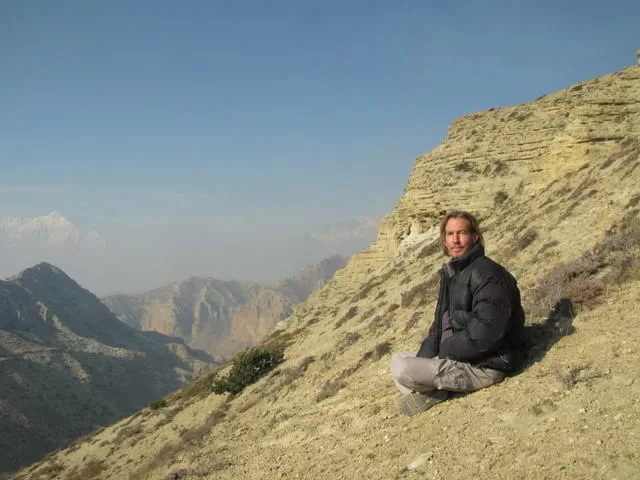
Go to a cave to meditate and then become Enlightened. That was all a fantasy, of course.
Was it easy to change your life like that? Did you have doubts?
There were moments when I doubted whether it was the right decision. When you make a huge move like that you are effectively recreating yourself. You’re letting go of this whole persona you created—you’re attached to it, and all your friends and your family are attached to it. You’re disassembling that and reassembling something else. That’s not an easy thing to do.
So you move to Kathmandu in 2006. You’re studying Buddhism at a Tibetan monastery. Then the head of the monastery learns of your background and asks for your help.
I had a very fixed idea of what I thought would happen – I’d attend this school, learn these esoteric practices, maybe go to a cave to meditate and then become Enlightened. That was all a fantasy, of course.
The monastery had just started construction on a $12 million project to repair a nunnery and they were focused on generating funding. The abbott, who’s the head of the monastery, learned that I used to work on Wall Street and asked if I’d work for them on money issues.
The Buddha said to approach everything skillfully. What that means is if you have a skill, you’re supposed to use that skill to help people.
I politely declined—something people do not normally do. Six months later he asked again, and again I said no. Shortly after that he asked a third time, and in the room there was a Jesuit priest from Boston College, who had also become a Tibetan lama. I said no and walked out and this priest followed me.
“You don’t get it,” he explained. “The Buddha said to approach everything skillfully. What that means is if you have a skill, you’re supposed to use that skill to help people.” I thought wow, yeah, that makes sense. I turned around, walked back in and accepted the job.
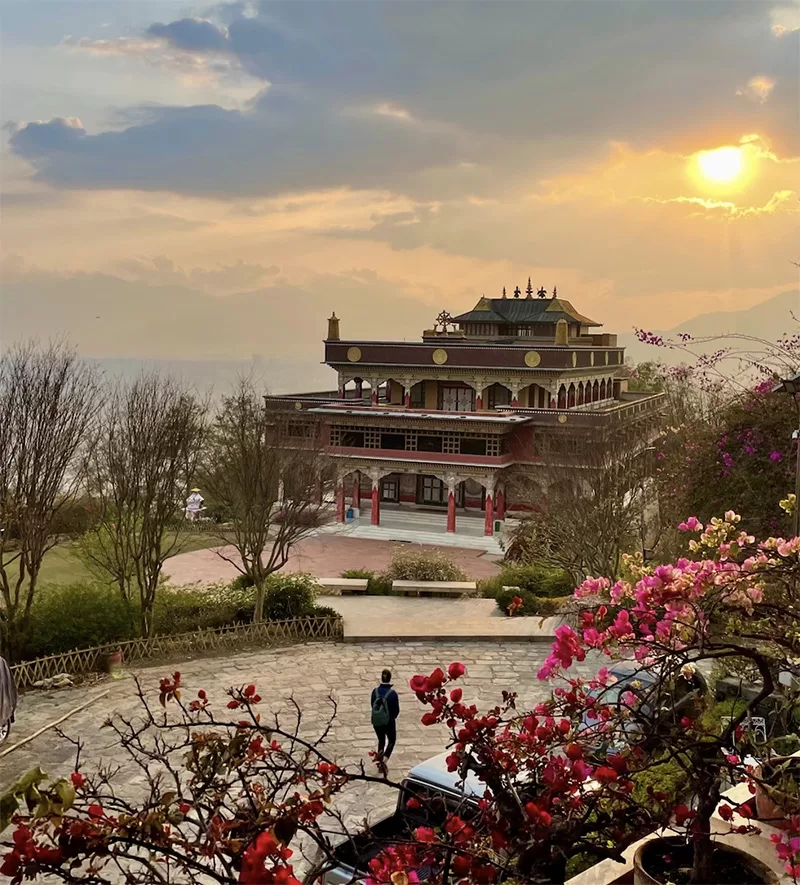
You ended up in the money business again. Talk a bit about traveling around the world with this prominent Tibetan lama, Chokyi Nyima Rinpoche. What was that like?
The lama was very happy, he thanked me and said: “Just one thing: don’t ask anybody for money.” I started laughing, and he said, “No, I’m serious.” I was very confused, almost thinking he was crazy. I asked some other people if he was kidding, and they said he meant it.
A few months later I tried to do a fundraiser and he said no no, we’re not doing that. For three years I just traveled around with him, in the entourage, going to lunch and dinner with wealthy and influential people all around the world. He’d put the main donor on his left side and me on the other side and we would just talk, no money discussions.
I remember I wanted my business card to read “Generosity Facilitator”—because it was really just that. I was only helping people do something they wanted to do.
One time in Mexico City he handed me the mic and said go out and tell them. I said tell them what? He said tell them your story. What story? He said tell them you used to work on Wall Street. So he literally had me walking out on stage to say “I’m James, I used to work in finance—and decided to change myself.”
All this was meant to build trust in his community for this guy who’d just shown up out of nowhere. For three years I’d just have lunch with people. They’d get to know me and then invite me to their house in Kuala Lumpur or Moscow, where they’d ask: “Hey James, does the lama need anything? Is there anything we could do?” That’s when things really started to change.
He was a great person to work for and absolutely flawless morally, this lama. In the end I was the one who learned about fundraising, from that whole exercise of building trust. I remember I wanted my business card to read “Generosity Facilitator”—because it was really just that. I was only helping people do something they wanted to do.
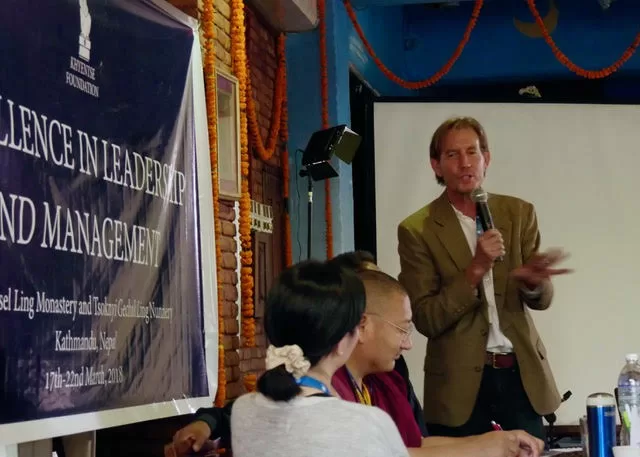
Despite working for the cause, you remained skeptical about how and whether these Buddhists were really helping people. Yet this cynicism of yours ultimately led to an inspiring project. Please share that story.
When I showed up at the monastery I thought I was the smartest guy in the room. I was still suspicious of ritual and authority figures, so I had a lot of questions.
At one of his popular Saturday classes the lama gave a talk about helping all sentient beings. “How are you benefiting them?” I asked. “You’re meditating, and what I see outside the door is poor people, orphans, old folks.” The lama responded, “All I’m telling you to do is go outside and the first person you see, help that person in whatever way you can.”
I walked outside and there was a little girl begging in the street. I gave her five rupees and she invited me to her house for tea. Of course I didn’t want to, but I said, OK, today I’ll say yes to everything. She led me on a 10-minute walk to this encampment of maybe 500 street beggars.
It’s absolute chaos, complete squalor, things are burning, people are screaming, and most of the men are drunk. I’d never seen anything like that. I was scared. Am I going to be robbed? But I just thought of what the lama told me to do.
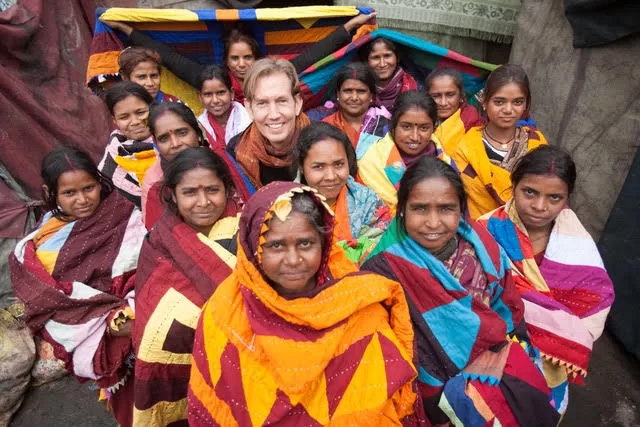
I sat down and drank the tea, then I started going back there nearly every day. I would help people read their medicine because nobody could read. I’d help them build their houses, little things like that. Then one day I saw a woman making what looked to me like a quilt.
For them it was a dowry gift—you make 7 of these bedcovers and maybe someone takes your daughter. I thought why don’t I take this, sell it in the U.S. and bring money back. So I took a quilt, sold it to my mom for $120 and brought the money to this woman.
We’ve given jobs to 25 women making traditional bedcovers. We’ve put more than 300 kids in school, mostly girls.
She wanted to give it to her husband, but I said no. Then the little girl who had brought me to the camp, who was a little too old to start school, said her sister wanted to go to school. So I took this girl down to the closest school and they said the cost for a year of school was $100. I paid for that and also bought her a uniform, shoes, and a backpack.
I thought, well that worked out nicely, let’s do it again. I did it again, and again, and again, and this turned into Quilts for Kids. We’ve given jobs to 25 women making traditional bedcovers. We’ve put more than 300 kids in school, mostly girls.
There are no more begging kids in that area. Right now we have a girl in nursing college and a boy in cooking school. Our oldest girl is studying at a women’s college in Virginia.
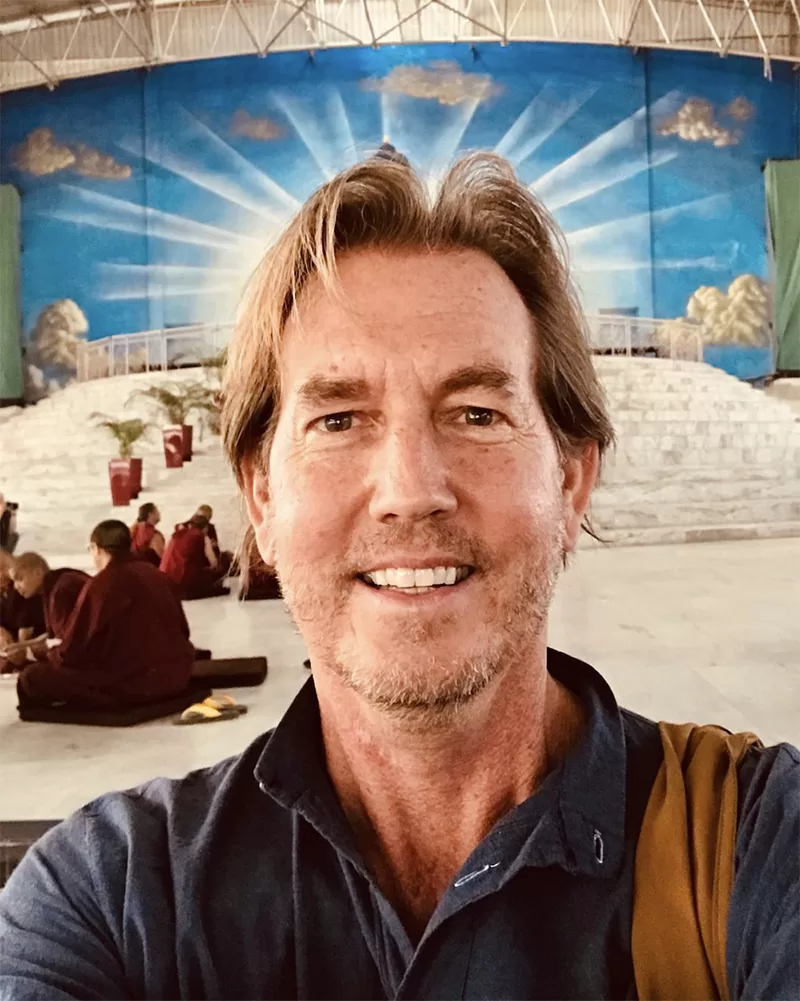
I wonder, what advice would you give somebody mulling a major change like moving abroad but worried it might not work out?
Even if you feel a little bit uncomfortable, take a risk. Just take that risk. If your instinct tells you it’s the right thing, don’t second guess it.
I’d say make your change in phases. Once I settled on Kathmandu, I didn’t just quit my job, sell my house and move. I phased into it over the course of years. I was spending more and more time over here while letting go of things back in the U.S. When I found an apartment here I kept my apartment back there for a while, to help me phase into it.
The other thing is have something to move into, rather than just away from. Like my Buddhism school in Nepal, have a structured plan for what you want to do with yourself and your time in the place you’re moving to.
Lastly, what I always tell young people is even if you feel a little bit uncomfortable, take a risk. Just take that risk. If your instinct tells you it’s the right thing, don’t second guess it. Just build something around it, and go for it. I’ve made a few dramatic changes in my life, and they’ve always paid off.
—————
Based in Kathmandu, James Hopkins is the founder and director of Quilts for Kids Nepal. Visit the website to donate or learn more.
